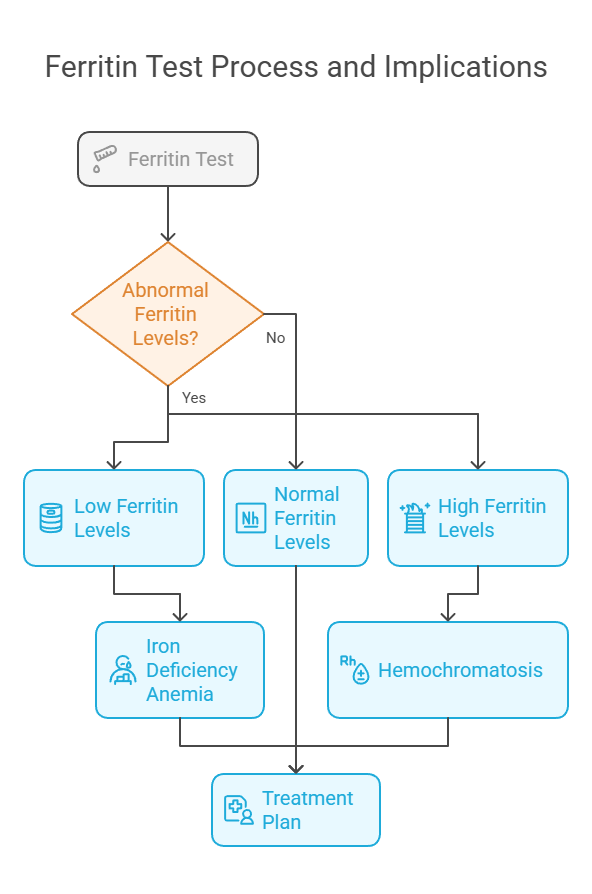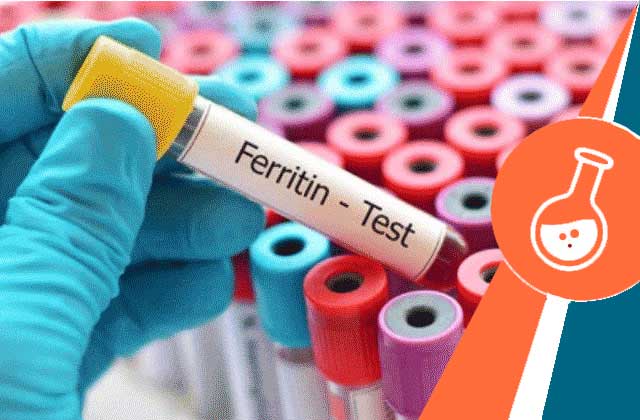
What is a Ferritin Test?
Ferritin test helps you determine the presence of ferritin in your blood levels. Ferritin is a protein that stores iron in the human body’s blood. This test is often used to diagnose health conditions related to iron deficiency or iron overload, including anaemia or hemochromatosis. It provides important information about the body’s iron levels, which can help in understanding various symptoms or managing known conditions.1
About Ferritin Test
Learn everything about Ferritin Test, before you book lab test online. Understand the why, how, and what of this test.
Why Do Doctors Recommend a Ferritin Test?
It is important to take a Ferritin blood test for the following reasons 2:
- Iron Level Management: This test helps determine and maintain healthy iron levels in your blood.
- Early Detection of Iron-Related Issues: It can aid in the timely detection of diseases caused by either iron deficiency or iron overload.
- Diagnosis and Treatment: A ferritin test can support the diagnosis and treatment of various conditions, including hemochromatosis, anaemia, restless legs syndrome, and some liver diseases.
- Monitoring Chronic Conditions: It can be used to monitor severe medical conditions such as kidney disease, cancer, and immune-related disorders that can impact iron levels.
How To Prepare For the Ferritin Test?
The steps below help you ensure that your Ferritin test provides the most accurate information about your health.
- Medication guidelines: Tell your healthcare provider about all the drugs, supplements or herbal remedies you are taking, as some substances may affect test results. Follow any specific instructions regarding drug adjustment before testing.
- Contact to doctor: Share your entire medical history with existing conditions or symptoms to help explain test results.
What Happens During Ferritin Testing?
A Ferritin Test only takes a few minutes.
- As per the scheduled time of the blood test, a Lab Technician who usually takes blood samples will arrive.
- A thin needle will be used to draw blood from your arm’s vein.
- The needle might cause a mild pinch and some discomfort.
- The lab technician then fills a collection tube with blood and then removes the needle from the skin.
- They place a small bandage on the arm.
Please note: There might be slight pain or bruising at the spot of insertion, but most of the symptoms go away quickly.
Finding Ferritin Test
Should you book blood test online to check your health condition or go to the nearest clinic and get it done by a medical professional? Let’s Find Out
Can I Take a Ferritin Test At Home?
Yes, the Ferritin Test can be taken at home. HealthcareOnTime’s at-home lab testing service, in association with thyrocare, provides a convenient and efficient way to get blood testing done from the comfort of your own home without the need for a doctor’s visit or a trip to a lab. It’s important to note that it’s always a good idea to consult with an expert healthcare provider about any queries you may have about your test results.
How Much Does the Ferritin Test Cost?
The Ferritin test price varies significantly depending on many factors:
- Location: The Ferritin test prices in India may vary depending on the city or the region in which the test is conducted. For example, in Bangalore or Mumbai, it might be expensive as compared to small towns.
- Type of facility centres: The Ferritin test charge also varies between private hospitals, government hospitals, and diagnostic centres. The cost is lower in government hospitals as compared to private ones.
- Healthcare centres: Diagnostic centres, laboratories and hospitals may have different Ferritin test prices. It depends upon the benefits and reputation of the healthcare centre.
- Insurance Coverage: Individuals with health insurance can cover partial or all costs depending on their policy coverage and network providers.
- Additional services: Additional services such as home sample collection, express test results, or additional charges for special management may be paid, which contributes to the overall Ferritin test price.
Generally, the Ferritin test cost in India ranges from Rs. 500 to Rs. 800. By opting for HealthcareOnTime lab test at-home facilities, you can access the Ferritin test at the cost of INR 750.
Test results Interpretation
You received your ferritin test results but still need help determining if they fall under the normal ferritin levels. Read this section to know if your results range between the ferritin test normal range.
What Does Ferritin Test Results Mean?
Normal Ferritin levels should range between 12 – 300 ng/M for males 3, which indicates that the iron levels in the blood are normal. While for females ferritin levels can range between 12 – 150 ng/ML.
However, any deviation from this range can mean the following:
- High levels of ferritin in the blood (serum ferritin) may be a sign of inflammation, including conditions like adult-onset Still’s disease, systemic juvenile idiopathic arthritis, and hemophagocytic lymphohistiocytosis/macrophage activation syndrome 4.
- A low ferritin level can indicate iron deficiency anaemia, blood loss (often from the gastrointestinal), or poor iron absorption 5.
What is the Normal Range for the Ferritin Test?
The normal ferritin range may differ from laboratory to laboratory mainly because of the different equipment used in the test process. A lower ferritin level in a person’s test result implies lower iron in the person’s blood.
| Ferritin Levels | Interpretation | Condition |
| 12 – 300 ng/mL | Normal | NIL |
| >300 ng/ML | High |
|
| <12 ng/ML | Low |
|
Gender-wise ferritin levels:
| Gender | Normal Ferritin Range |
| Male | 12 – 300 ng/mL |
| Female | 12 – 150 ng/mL |
What is Considered Low Ferritin Levels?
Ferritin levels below the normal range, which is 12 nanograms per millilitre, are considered as low Ferritin levels.
What is Considered High Ferritin Levels?
Ferritin levels above the normal range, which is 300 nanograms per millilitre in males and 150 nanograms per millilitre in females, are considered higher than normal.
What Medical Conditions Can Cause High Ferritin Levels?
Excess iron buildup (hemochromatosis) can cause a range of symptoms, including 6:
- Joint pain: Often in the hands, knees, and ankles.
- Fatigue and lack of energy: This can be a significant issue for people with iron overload.
- Abdominal pain: This can be a dull ache or a more severe cramp.
- Weight loss: Often unexplained and unintentional.
- Heart problems: Iron overload can increase the risk of heart disease.
- Loss of sex drive: Both men and women can experience decreased libido.
- Joint damage: In severe cases, excess iron can damage joints.
What Medical Conditions Can Cause Low Ferritin Levels?
Low Ferritin levels can cause a variety of symptoms, including 7:
- Fatigue and weakness: These are often the most noticeable symptoms and can significantly impact daily activities.
- Pale skin, lips, and Brittle Nails: This occurs because a lack of iron reduces the oxygen-carrying capacity of red blood cells.
- Shortness of breath (dyspnea) and rapid heartbeat (tachycardia): The body tries to compensate for the lack of oxygen by breathing harder and increasing heart rate.
- Dizziness or lightheadedness: This can happen due to decreased blood flow to the brain.
- Cold hands and feet: Reduced blood flow can also cause extremities to feel cold.
More Related Tests
Why To Book with HealthCareOnTime

17 Crores+ Samples Processed

World Class Technology Labs

25+ Years of Trust & Experience











